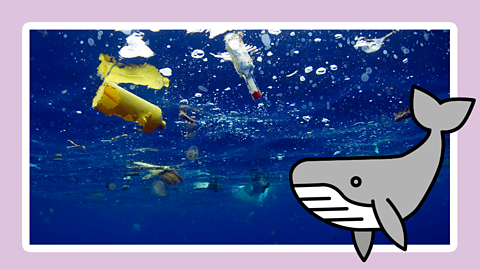
Welcome to The Regenerators.
Introduction
Poems are a fun way to help us think about things like plastic waste.
Poets use rhyming and alliteration to catch our attention when we read or hear a poem.
You can write your own poem about anything!
Plastic Problems
Watch this animated video to see how poetry can be used to tell a story and to teach us about plastic waste.
Narrator
The things that we eat and the things that we buy
Are causing us problems and I'll tell you why.
They come in a box, a bag or a cup
That we throw in the bin for someone else to pick up.
Some we recycle and reuse, true enough
But what happens to all the rest of the stuff?
It goes in a hole in the ground out of sight.
But if we can’t see it, does that make it right?
The plastic they’re made from lasts for so long
To dump it and hide it seems very wrong.
What will they say in years from now?
When they dig up this rubbish, they’ll all wonder how
We managed to bury so much of our waste
From bottles and wrappers to tubes of toothpaste.
And that’s just the rubbish we put in the ground
Much of it lies in wait to be found
By birds and fish who think that the taste
Will be food to eat and not plastic waste.
But don’t be sad, for there is a solution
To the puzzling problem of plastic pollution.
Use less, of course, that helps a lot
But don’t forget the things that can rot.
There’s paper and cardboard that we can use
And biodegradable bags to choose.
For instead of lasting year after year
It only takes weeks until they disappear.
So next time you’re shopping, and given the choice
Make a difference, speak up, raise your voice!
Tell all those who will listen and the rest:
For the sake of the future, do what is best.
Reduce, reuse, recycle, oh yes!
Let’s try our hardest to use plastic less.
How do poets write poems?
A person who writes a poem is called a poet.
Poets do lots of things to make their poems nice to read and hear.
They find ways to make sure the poem sticks in our mind.
Rhyming
Words that rhyme have the same sound.
The Plastic Problems poem has lots of rhyming words, like lot and rot.
Don’t forget that different letters sometimes make the same sound.
Some we recycle and reuse, true enough
But what happens to all the rest of the stuff?
In this example, enough and stuff are rhyming words. They look different but they sound the same.
Rhyme scheme
Plastic Problems uses a clear and simple rhyme scheme.
You can work out the rhyme scheme by making a note next to the words that rhyme with each other.
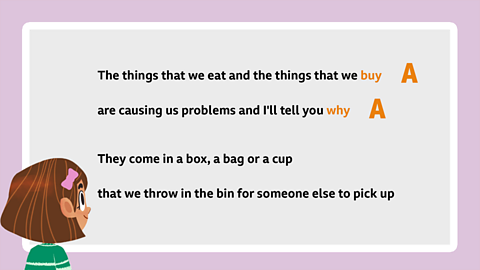
Image caption, Lines one and two
These lines rhyme with each other so we can write A next to them.
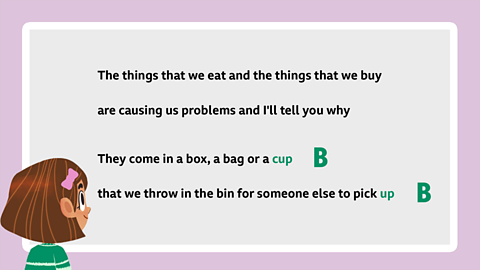
Image caption, Lines three and four
These lines rhyme with each other but not with the first two lines, so we can write the letter B.
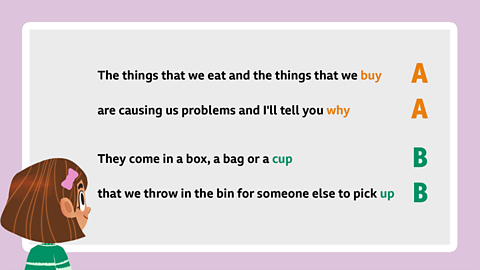
Image caption, The rhyme scheme
We can say that this part of the poem has an A A B B rhyme scheme.
1 of 3
Alliteration
Alliteration is when words start with the same sound.
Writers often use it to grab your attention, like in this example.
The puzzling problem of plastic pollution.
The repeated p sound makes this line stand out when we hear and read it.
Double meaning
Listen to this short poem.
Jodie said she saw a bat
I asked, "Does it live in a cave?"
She looked at me like I was mad
"No - in a softball game!"
The poet uses double meaning to make the poem fun.
In the first line, we think Jodie is talking about an animal bat. Then we find out Jodie is talking about a bat used to play softball.
The words look and sound the same but they have different meanings.
Think about the Plastic Problems poem
Using what you've learnt, make notes on the Plastic Problems poem.
Look out for rhyming words and the rhyme scheme, alliteration and double meanings.
This document can be be viewed online, downloaded or printed.
Lesson complete!
Well done Regenerator, you've completed this lesson.
See what you can remember in this listening quiz.
Write your own poem
Now you've learnt about the Plastic poem, it's time to write your own.
- Your poem can be as short or as long as you like.
- You could make the poem about plastic waste or anything else that you would like to write.
- Try to include rhyme and alliteration.
- When you're written your poem, you could perform it out loud for your family or friends.
Use your imagination and have fun!
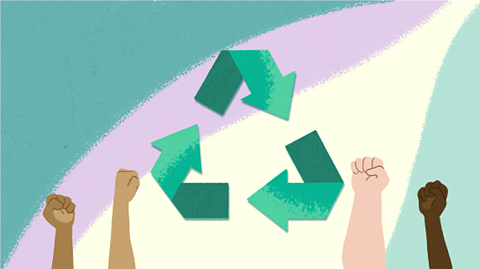
There's more to learn
How to make an upcycled puppet
GREEN CLASSROOM

Year 1 - 2 and P2 - P3
GREEN CLASSROOM
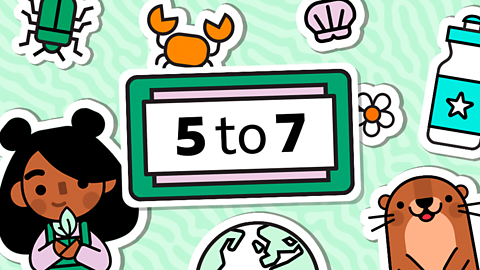
More from The Regenerators
BBC BITESIZE


